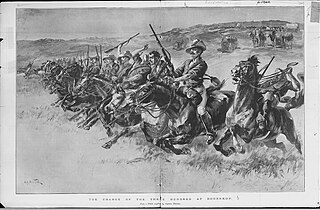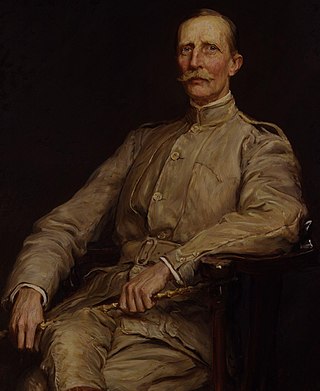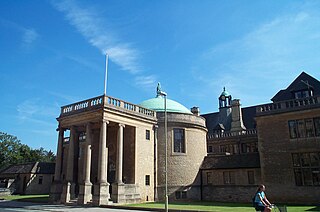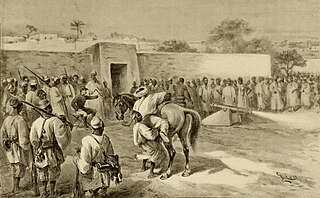Related Research Articles

The Cape Colony, also known as the Cape of Good Hope, was a British colony in present-day South Africa named after the Cape of Good Hope. It existed from 1795 to 1802, and again from 1806 to 1910, when it united with three other colonies to form the Union of South Africa, then became the Cape Province, which existed even after 1961, when South Africa had become a republic, albeit, temporarily outside the Commonwealth of Nations (1961–94).
Action theory is an area in philosophy concerned with theories about the processes causing willful human bodily movements of a more or less complex kind. This area of thought involves epistemology, ethics, metaphysics, jurisprudence, and philosophy of mind, and has attracted the strong interest of philosophers ever since Aristotle's Nicomachean Ethics. With the advent of psychology and later neuroscience, many theories of action are now subject to empirical testing.

The Jameson Raid was a botched raid against the South African Republic carried out by British colonial administrator Leander Starr Jameson, under the employment of Cecil Rhodes. It involved 500 British South Africa Company police launched from Rhodesia over the New Year weekend of 1895–96. Paul Kruger, for whom Rhodes had great personal hatred, was president of the South African Republic at the time. The raid was intended to trigger an uprising by the primarily British expatriate workers in the Transvaal but it failed. The workers were referred to as The Johannesburg Conspirators. They were expected to recruit an army and prepare for an insurrection; however, the raid was ineffective, and no uprising took place. The results included embarrassment of the British government; the replacement of Cecil Rhodes as prime minister of the Cape Colony; and the strengthening of Boer dominance of the Transvaal and its gold mines. Also, the withdrawal of so many fighting men left Rhodesia vulnerable, one factor that led just a couple of months later to the Second Matabele War. The raid was a contributory cause of the Second Boer War.

Cecil John Rhodes was an English mining magnate and politician in southern Africa who served as Prime Minister of the Cape Colony from 1890 to 1896. He and his British South Africa Company founded the southern African territory of Rhodesia, which the company named after him in 1895. He also devoted much effort to realising his vision of a Cape to Cairo Railway through British territory. Rhodes set up the Rhodes Scholarship, which is funded by his estate.

The Scramble for Africa was the invasion and colonisation of most of Africa by seven Western European powers during the era of "New Imperialism" (1833–1914). In 1870, 10% of the continent was formally under European control. By 1914, this figure had risen to almost 90%, with only Liberia and Ethiopia retaining their full sovereignty.

Sir George Dashwood Taubman Goldie was a Manx administrator who played a major role in the founding of Nigeria. In many ways, his role was similar to that of Cecil Rhodes elsewhere in Africa but he did not seek publicity.

The Royal Niger Company was a mercantile company chartered by the British government in the nineteenth century. It was formed in 1879 as the United African Company and renamed to National African Company in 1881 and to Royal Niger Company in 1886. In 1929, the company became part of the United Africa Company, which came under the control of Unilever during the 1930s and continued to exist as a subsidiary of Unilever until 1987, when it was absorbed into the parent company.

Dame Flora Louise Shaw, Lady Lugard, was a British journalist and writer. She is credited with having coined the name Nigeria.

Communal violence is a form of violence that is perpetrated across ethnic or communal lines, where the violent parties feel solidarity for their respective groups and victims are chosen based upon group membership. The term includes conflicts, riots and other forms of violence between communities of different religious faith or ethnic origins.

The South African Wars, including but also known as the Confederation Wars, were a series of wars that occurred in the southern portion of the African continent between 1879 and 1915. Ethnic, political, and social tensions between European colonial powers and indigenous Africans led to increasing hostilities, culminating in a series of wars and revolts, which had lasting repercussions on the entire region. A key factor behind the growth of these tensions was the pursuit of commerce and resources, both by countries and individuals, especially following the discoveries of diamonds in the region in 1867 and gold in 1862.

Rhodes House is a building part of the University of Oxford in England. It is located on South Parks Road in central Oxford, and was built in memory of Cecil Rhodes, an alumnus of the university and a major benefactor. It is listed Grade II* on the National Heritage List for England.

Ashimi or Hashim bin Umar al-Kanemi (1840s-1893) was Shehu of Borno from ca.1885 to 1893.
Kyari or Khair bin Bukhar al-Kanemi (?-1894) was Shehu of Borno in 1893–1894.

The British South Africa Company's administration of what became Rhodesia was chartered in 1889 by Queen Victoria of the United Kingdom, and began with the Pioneer Column's march north-east to Mashonaland in 1890. Empowered by its charter to acquire, govern and develop the area north of the Transvaal in southern Africa, the Company, headed by Cecil Rhodes, raised its own armed forces and carved out a huge bloc of territory through treaties, concessions and occasional military action, most prominently overcoming the Matabele army in the First and Second Matabele Wars of the 1890s. By the turn of the century, Rhodes's Company held a vast, land-locked country, bisected by the Zambezi river. It officially named this land Rhodesia in 1895, and ran it until the early 1920s.
laNgolotsheni (Lomawa) Ndwandwe was the Ndlovukati of Swaziland, the wife of King Ngwane V, and the mother of King Sobhuza II.

Apollos Okwuchi Nwauwa is a Nigerian-born historian and professor of Africana Studies. He is currently the Director of Africana Studies, College of Arts and Sciences, Bowling Green State University, Bowling Green, Ohio. Nwauwa earned his Bachelor of Arts (B.A.) degree from the then Bendel State University Ekpoma, Edo State, Nigeria. He received his M.A. and Ph.D. in History at Dalhousie University, Halifax, Nova Scotia Canada, in 1989 and 1993 respectively. Nwauwa is a members of many learned societies and served as President of the Igbo Studies Association from 2010-2014. He is the current editor of OFO: Journal of Transatlantic Studies. Nwauwa is author and editor of many book and scholarly journal articles.
Mark Goldie is an English historian and Professor of Intellectual History at Churchill College, Cambridge. He has written on the English political theorist John Locke and is a member of the Early Modern History and Political Thought and Intellectual History subject groups at the Faculty of History in Cambridge.
Wale Adebanwi is a Nigerian-born first Black Rhodes Professor at St Antony's College, Oxford where he was, until June 2021, a Professor of Race Relations, and the Director of the African Studies Centre, School of Interdisciplinary Area Studies, and a Governing Board Fellow. He is currently a Presidential Penn Compact Professor of Africana Studies at the University of Pennsylvania. Adebanwi's research focuses on a range of topics in the areas of social change, nationalism and ethnicity, race relations, identity politics, elites and cultural politics, democratic process, newspaper press and spatial politics in Africa.
Bonny Ibhawoh is the Senator William McMaster Chair in Global Human Rights, Fellow of the Royal Society of Canada, Expert-Rapporteur, United Nations Expert Mechanism on the Right to Development, UN-OHCHR and Founding Director, Centre for Human Rights and Restorative Justice

Okukor is the name given to a bronze statue of a cock from West Africa, held by Jesus College, Cambridge, from 1905 to 2021. One of the Benin bronzes, it was taken from the Kingdom of Benin during the Benin Expedition of 1897, a punitive expedition dispatched to punish the Oba of Benin after a Royal Niger Company delegation was ambushed and killed. It became controversial in 2016 as an example of looted art, with demands that the statue be repatriated back to Nigeria. It was transferred to Ewuare II, Oba of Benin, and Nigeria's National Commission for Museums and Monuments by Jesus College in 2021.
References
- ↑ "Obituary for John Edgar Flint". Hulse, Playfair & McGarry. Retrieved 2 January 2024.
- ↑ Youé, Chris and Tim Stapleton, "John Flint and agency in history" in Chris Youé and Tim Stapleton (Eds.) Agency and action in colonial Africa: Essays for John E. Flint. Palgrave Macmillan, 2001. p. 3. ISBN 978-0333778852
- ↑ "Reference at www.mun.ca".
- ↑ Gunn, Iain (October 1961). "Sir George Goldie and the Making of Nigeria". African Affairs . 60 (241): 546–547. doi:10.1093/oxfordjournals.afraf.a094927. ISSN 1468-2621.
- ↑ "Cambridge history africa volume 5 | Regional history after 1500 | Cambridge University Press".
- ↑ "Agency and Action in Colonial Africa | SpringerLink".
- ↑ Austen, Ralph A. (2002). "Review of Agency and Action in Colonial Africa: Essays for John E. Flint, Chris Youé". The International History Review . 24 (3): 658–660. JSTOR 40110219.
- ↑ Peck, Christopher (2007-10-21). "Obituary: Richard Flint". The Guardian . Retrieved 2018-09-03.